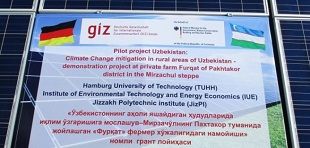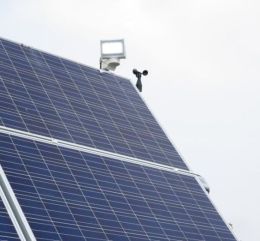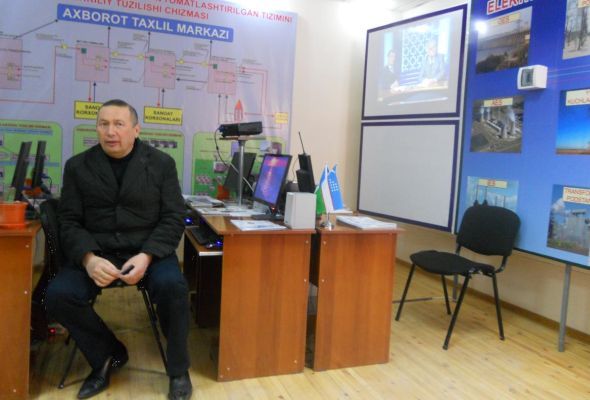A sunny future for Uzbekistan

First battery-backed 6.75 kW solar plant will bring reliable energy to farms.
In August 2016 the first battery-backed 6.75 kW solar plant was officially inaugurated at a farm in the Pakhtakor district, situated in the agriculture-dominated Jizzakh region about 100 km west of Uzbekistan’s capital Tashkent. The battery allows constant delivery of solar energy during day and night. It is the very first professional used solar plant in the Jizzakh region and amongst the first ones in Uzbekistan.
 An important aim of the pilot project is to promote solar energy in order to make up for public electricity interruptions in rural areas. This will enable the use of agricultural technologies that require uninterrupted cooling, venting, and others – while giving its contribution to climate protection. In order to expand the scope of technical applications in October 2016 the solar system was transferred to the farm Zangzor that offers a broader spectrum of agricultural technologies including the important area of solar power irrigation. In the average the solar system delivers about 30 kWh/day – naturally more in summer and less in winter. It is planned that in a follow-up project a large number of comparable solar stations will be established in a similar environment.
An important aim of the pilot project is to promote solar energy in order to make up for public electricity interruptions in rural areas. This will enable the use of agricultural technologies that require uninterrupted cooling, venting, and others – while giving its contribution to climate protection. In order to expand the scope of technical applications in October 2016 the solar system was transferred to the farm Zangzor that offers a broader spectrum of agricultural technologies including the important area of solar power irrigation. In the average the solar system delivers about 30 kWh/day – naturally more in summer and less in winter. It is planned that in a follow-up project a large number of comparable solar stations will be established in a similar environment.
 Many interested future users of solar energy – mainly from small business companies and farms – followed the inauguration as well as local government officials and project partners from the Hamburg University of Technology (TUHH) and the Jizzakh Polytechnical institute (JPI). At the end of the project the JPI will become the owner of the solar station receiving a compensation for the solar energy delivered to the farm Zangzor according to the actual calculated cost. This compensation will be used for a continuous training and support of the solar energy users in the Jizzakh region.
Many interested future users of solar energy – mainly from small business companies and farms – followed the inauguration as well as local government officials and project partners from the Hamburg University of Technology (TUHH) and the Jizzakh Polytechnical institute (JPI). At the end of the project the JPI will become the owner of the solar station receiving a compensation for the solar energy delivered to the farm Zangzor according to the actual calculated cost. This compensation will be used for a continuous training and support of the solar energy users in the Jizzakh region.
As the previous rector Ergash A. Saliev of the Jizzakh Polytechnical institute – now hakim (governor) of the Arnasay district in the Jizzakh region – emphasized, "this project will be important for the accelerated introduction of renewable energy in Uzbekistan and also be a challenge for educational institutes to widely promote the technical knowledge about solar energy ".
The inauguration ceremony was followed by a seminar on the future prospects of solar energy in Uzbekistan with special regard to climate conservation.

The activities are embedded in the regional programme "Capacity Development for Climate Policy in the Western Balkan, Central and Eastern Europe and Central Asia Phase II" which is being implemented by the Deutsche Gesellschaft für Internationale Zusammenarbeit (GIZ) GmbH in several countries of the region on behalf of the German Environment Ministry (BMUB). This project is part of the International Climate Initiative (IKI). The acting ambassador of the Federal Republic of Germany, Mrs. Melanie Moltmann, explained at the opening ceremony of the solar plant the importance of the regional program. She emphasized that "the pilot project we are inaugurating today complies with all the requirements of the program and will hopefully also fulfil the expected outcomes of making a broader contribution to a sustainable development in Uzbekistan. It has been recognized that decentralized power from solar energy is a solution to shortcomings of electricity supplies in rural areas while ensuring climate friendliness".
The link has been copied to the clipboard
Contact
IKI Office
Zukunft – Umwelt – Gesellschaft (ZUG) gGmbH
Stresemannstraße 69-71
10963 Berlin




![[Translate to English:]](/legacy/_processed_/0/d/csm_181102_Albanien_FiKiBio_656_9fa7345f1d.jpg)




